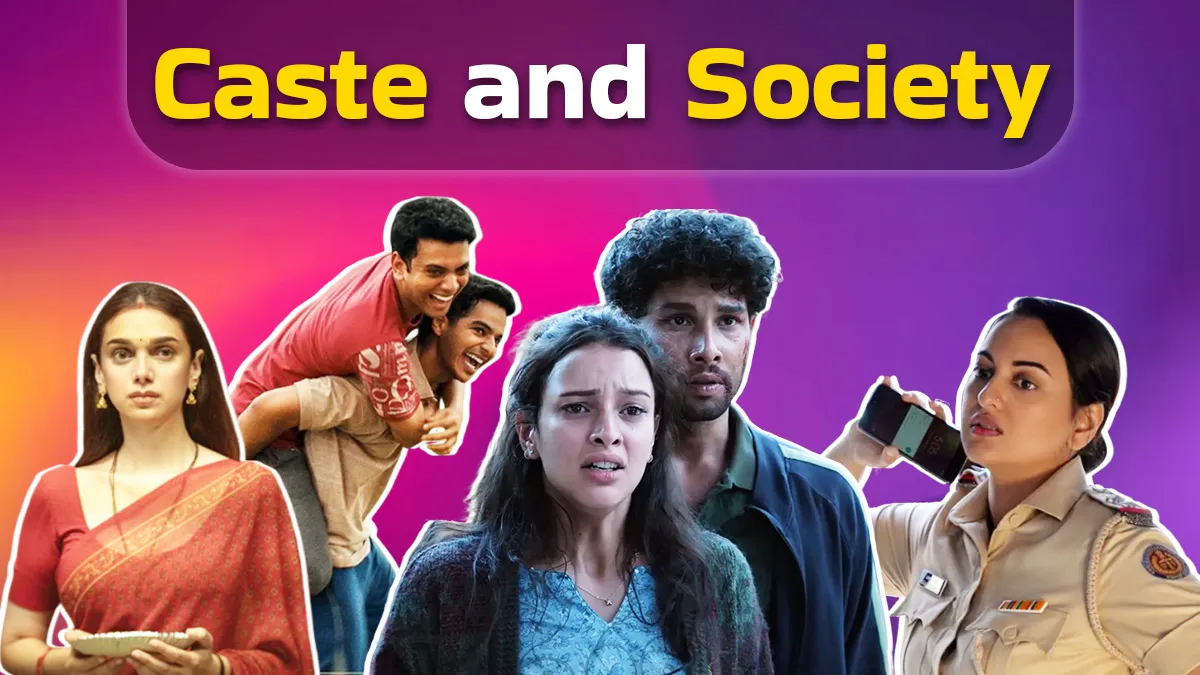
“Love is blind, but in India, it’s scrutinised.” - Nagraj Manjule (Sairat, Fandry). India may be racing toward modernity with tech startups and skyscrapers, but scratch the surface, and ancient prejudices are very much alive. From courtrooms where justice feels out of reach to romances crushed under centuries-old hierarchies, these 12 films and series are not easy viewing. They make you uncomfortable, force reflection, and remind us that while progress exists, caste still dictates who can love, who receives justice, and who is allowed to dream.
12 powerful Indian films and web series that expose how caste discrimination shapes love, justice, and everyday life in modern India.
Shyam Benegal's powerful debut tears apart the illusion that Dalit women have any real agency in upper-caste households. Lakshmi, working as a domestic help, is seduced and then abandoned by her wealthy employer. The film exposes the brutal reality of how caste determines morality, especially when it comes to controlling women's bodies.
What happens when someone with privilege actually pays attention? This hard-hitting film follows IPS officer Ayan Ranjan as he investigates missing girls in rural Uttar Pradesh and uncovers a cesspool of caste-based discrimination and violence. Inspired by real incidents, ‘Article 15’ shows how bureaucracy and brutality work hand-in-hand to silence Dalit voices.
This Tamil masterpiece doesn't romanticise caste, it shatters any illusions you might have. Perumal, a Dalit student, dreams of becoming a lawyer like Dr Ambedkar after a personal tragedy. His friendship with an upper-caste classmate seems innocent until it collides headfirst with the violent reality of caste in India. The film was later remade as’ Dhadak 2’, but the original's raw power remains unmatched.
A rare film about caste consciousness developing in real-time. Santya, a young man caught up in hyper-nationalism, slowly wakes up to the caste oppression happening right around him. Guided by Ambedkarite philosophy, he begins shedding his prejudices and understanding caste as systematic injustice rather than individual bias.
Director Neeraj Ghaywan crafts a layered story about two queer women, one from a dominant caste, one Dalit. Their power dynamic shifts dramatically when caste enters the picture. The film brilliantly shows how privilege disguises itself in liberal smiles and progressive language. Konkona Sen Sharma delivers an electric performance as Bharti, a queer Dalit woman navigating exclusion at work and invisibility in her personal life.
Jabya's crush on an upper-caste girl isn't just about teenage heartbreak, it's about systematic humiliation. This Dalit boy in a Maharashtrian village dreams of romance, respect, and a future his caste won't allow. Director Nagraj Manjule shows how what seems like innocent puppy love is actually weaponised by centuries of exclusion.
Bimal Roy's classic tells the story of a Dalit girl raised by a Brahmin family who faces quiet rejection despite their apparent affection. When she falls for an upper-caste man, her untouchable identity resurfaces, exposing how caste cruelty operates even in otherwise loving environments.
Caste isn't explicitly named here, but it's everywhere you look. Four migrant workers are tortured into false confessions because their lives are considered disposable. This chilling film reveals how the state brutalises the powerless and then buries the truth. It's about who gets to be believed, who gets protection, and who's left to rot in the system.
Based on a real 1993 case, this film follows Sengeni, a tribal woman whose husband disappears from police custody after being falsely accused of theft. Her relentless search for justice, aided by an activist lawyer, exposes the brutality embedded in India's institutions. Sengeni's resilience is a masterclass in how caste violence gets institutionalised and how fighting it requires superhuman strength.
Love tries to overcome caste, but caste has the last word. This isn't just a tragedy, it's a warning. When Dalit assertion meets dominant-caste ego, even the purest love cannot survive the violence of hierarchy. The film's ending left audiences devastated and talking for months. Bollywood's 2018 remake ‘Dhadak’ softened the edges, but the original's brutal honesty remains unmatched.
Mohammed Shoaib Ali and Chandan Kumar, one Muslim, one from a backward caste, simply want to be seen beyond their identities. They're just two friends dreaming of joining the police force. But a virus, a forced journey home, and the state's neglect strip away their hope piece by piece. What remains is the brutal reminder that their lives matter so little, they're only noticed when they're dead on the streets. The film has received critical acclaim, with 96% positive reviews on Rotten Tomatoes, proving that audiences are hungry for honest storytelling.
This psychological crime thriller about missing girls and a serial killer digs into society's festering wound of marginalisation. The real horror isn't just the murders, it's understanding how the killer was shaped by his haunting past and his obsession with punishing women who dared to choose love outside their designated place.
Don't Miss: Liked Monster: The Ed Gein Story? 5 True Crime Serial Killer Shows You Can Watch On OTT
Keep reading Herzindagi for more such stories.
Our aim is to provide accurate, safe and expert verified information through our articles and social media handles. The remedies, advice and tips mentioned here are for general information only. Please consult your expert before trying any kind of health, beauty, life hacks or astrology related tips. For any feedback or complaint, contact us at compliant_gro@jagrannewmedia.com.